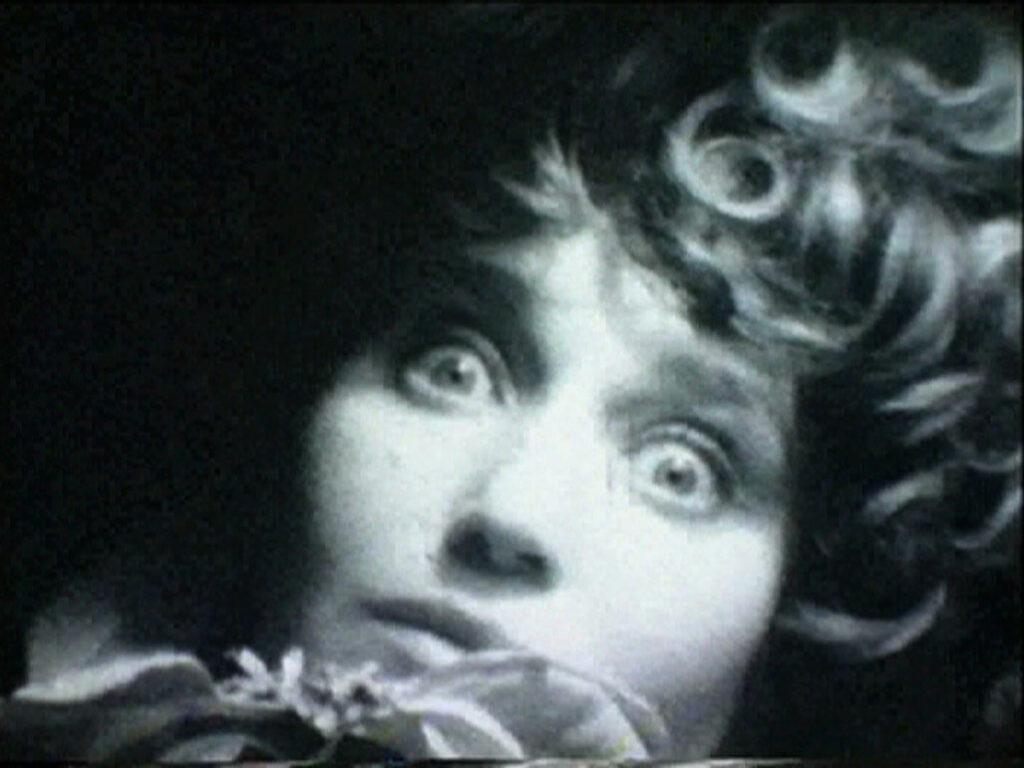
Selbstportrait mit Kopf (Self-Portrait with Head) (1966–1967) by Valie Export
Sunday, June 16, 2024, 7:30 pm
Women/Men/Animals
Film & Video Works by Valie Export
Presented in association with CounterPulse
Admission: $15 General / $12 Cinematheque Members
Event tickets here
My artistic work centres on the human body as medium of information, as signal bearer of meaning and communication. I occupy myself with the pictorial representation of mental states, with the sensations of the body when it loses its identity, when the ego gnaws its way through the scraps of skin, when steel casings straighten the joints and the worn-out identity is nailed with steel pins to modern mythomania… I try to shape the social structures (power current) and standards (mutilations) of life into a metanoia of pictures. (Valie Export, 1980)
Artist Valie Export (b. Linz, Austria, 1940) is known for a body of film, video, performance and installation work focusing on the embodied position of the female artist situated in the contemporary patriarchal dystopia. Emerging from the same post-war context of generational reckoning that spawned Viennese Aktionism, Export’s work eschews the Aktionists’ self-abusing quests for catharsis, creating instead intimately mediated performances, that, while just as confrontational and assertively body-based, present darker critiques of media and representation while exploring the politics of eroticism and presenting subtly bitter attacks on bourgeois consumption and relations. On the occasion of the digitization of Export’s complete works by sixpackfilm, Cinematheque is proud to present this selection of films, videos and performance documentations by Valie Export. (Steve Polta)
SCREENING:
Selbstportrait mit Kopf (Self-Portrait with Head) (1966–1967) by Valie Export; 16mm screened as digital video, b&w, 4 minutes.
Body Tape (1970) by Valie Export; video, b&w, 4 minutes.
Mann & Frau & Animal (Man & Woman & Animal) (1970–1973) by Valie Export; 16mm screened as digital video, b&w, 8 minutes.
Hauchtext (Breath Text: Love Poem) (1970-1973) by Valie Export; video, 2 minutes.
Facing a Family (1971) by Valie Export; video, 5 minutes.
Remote… Remote… (1973) by Valie Export; 16mm screened as digital video, color, 10 minutes.
Hyberbulie (1973) by Valie Export; video, 7 minutes.
Syntagma (1984) by Valie Export; 16mm screened as digital video, color, b&w, 20 minutes.
Die Zweiheit der Natur (The Duality of Nature) (1986) by Valie Export; video, 2 minutes.
All exhibition files from sixpackfilm
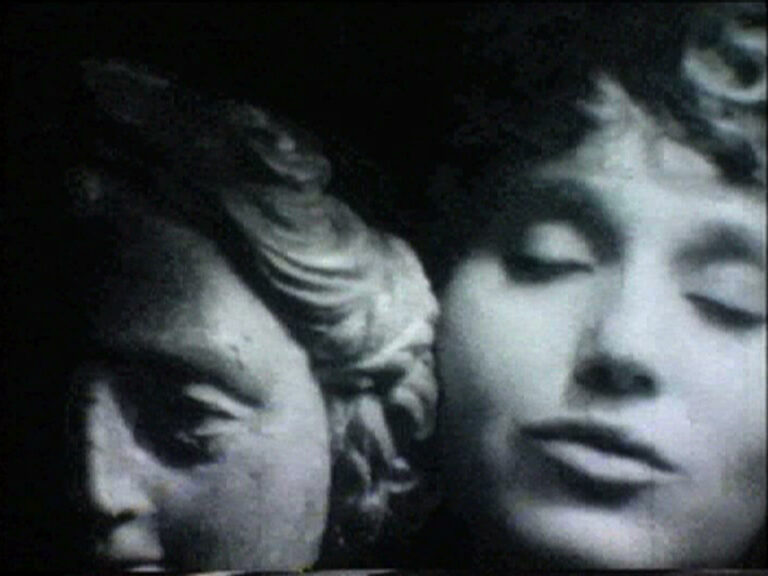
Selbstportrait mit Kopf (Self-Portrait with Head) (1966-1967) by Valie Export
In her first film self-portrait, Valie Export wears an attention-getting curly wig and caresses a woman´s breasts in slow motion, then lasciviously closes and opens her eyes. The carefully applied makeup and wig tell of disguise and acting, and are simultaneously beautiful and terribly stony like the anonymous woman’s head. The brevity and slow speed are reminiscent of Andy Warhol´s Screen Tests, in which every single one of the face’s movements become visible. (Brigitta Burger-Utzer)
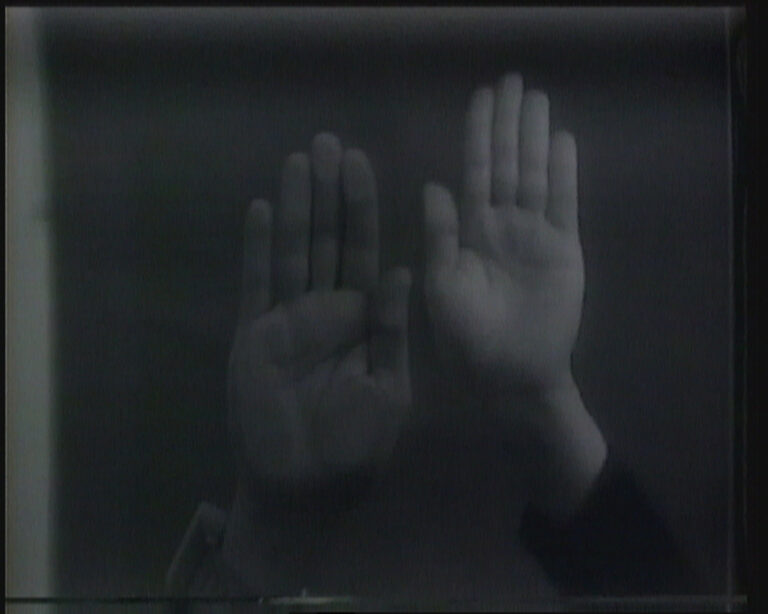
Body Tape (1970) by Valie Export
Body Tape is about a series of banal daily actions performed as conceptual gestures with filmic intertitles (Touching, Boxing, Feeling, Hearing, Tasting, Pushing) reminiscent of educational films. Here too, it is the reediting of language and action, both of the body and the medium, which is carried out, simultaneously separating and unifying “cuts” or edits between the performance’s spatial structure and its perception by an audience. The artist gives directions from behind a screen or analogous sheet of glass used as a projection surface. The performative happening is thereby rigged by the unavoidable media images appearing on the monitor or projection surface, composed of a montage of text and action. (Sabeth Buchmann)
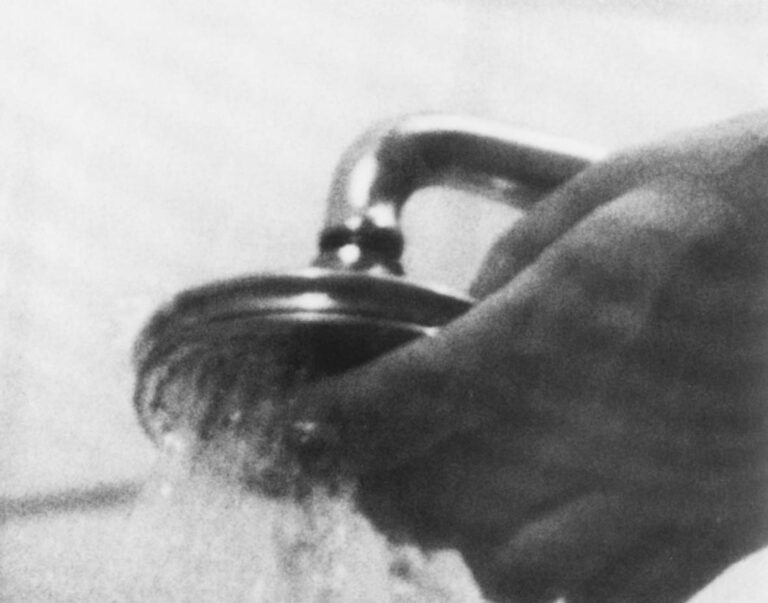
Mann & Frau & Animal (Man & Woman & Animal) (1970-1973) by Valie Export
Instead of the holy trinity: father, son, holy spirit, instead of the profane trinity: mother, family, state, instead of the social trinity: father, mother, children the film treats the real trilogy in 3 sections. What unites man and woman (not uniquely for sure, but what is being concealed) is the history of nature. (Valie Export)
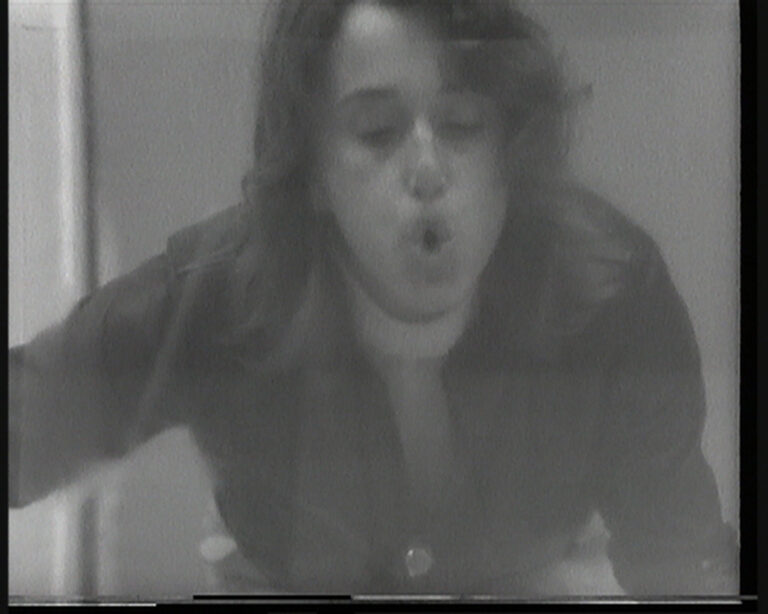
Hauchtext (Breath Text: Love Poem) (1970-1973) by Valie Export
Breath Text is a powerfully simple performance in which Valie Export creates tension by breathing compulsively. (sixpackfilm)
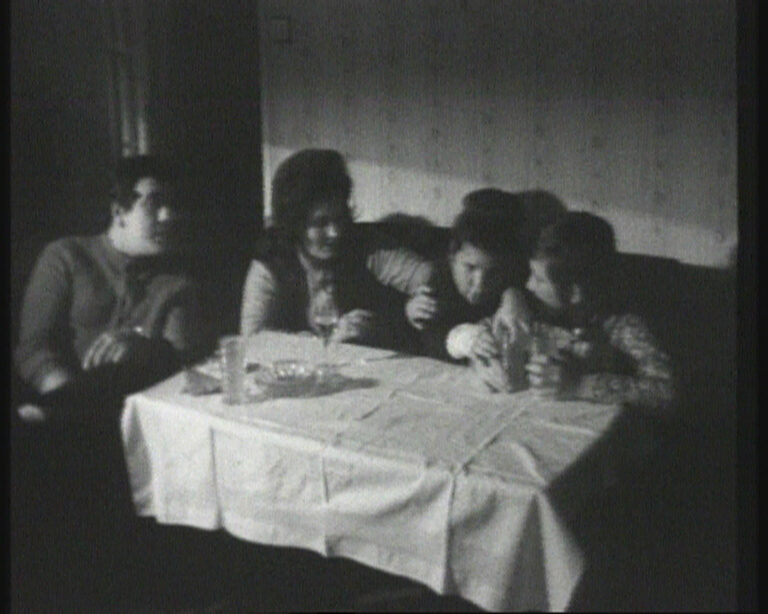
Facing a Family (1971) by Valie Export
Facing a Family was originally broadcast on Austrian Network Television, February 2, 1971. Two families sit opposite each other. One is on TV, the other at home. A camera superimposes the reactions of the living room family onto the one on the screen, so that both families are not watching a show but rather the reactions of the other. In this work Export is not only exploring the (re-)production of reality through and in the medium of television, but at a very early stage also incorporates the reactions of the audience in this process of constitution. (Jens Kastner)
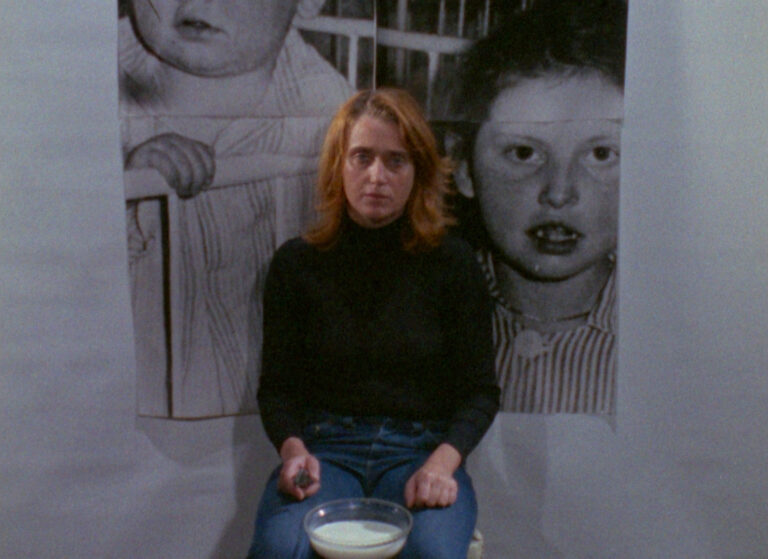
Remote… Remote… (1973) by Valie Export
Remote… Remote… is not, as was said, a film about suffering. The actress (the artist) does not suffer. Or does not show. It’s a film about the wound. For the woman mutilates herself, the essence lies in the result: blood. These repeated mutilations cause her to bleed continuously, which she staunches by sucking her reddened fingers. But as the blood continues to flow, she ends up plunging it in a bowl of milk. Red and white. These are the very fluids of femaleness: lactescence (maternal) and menstruation (sexual). But these barbaric weddings are more than a mixture: a metamorphosis. Valie Export turns milk into blood. And the body into tragedy. (Régis Michel)
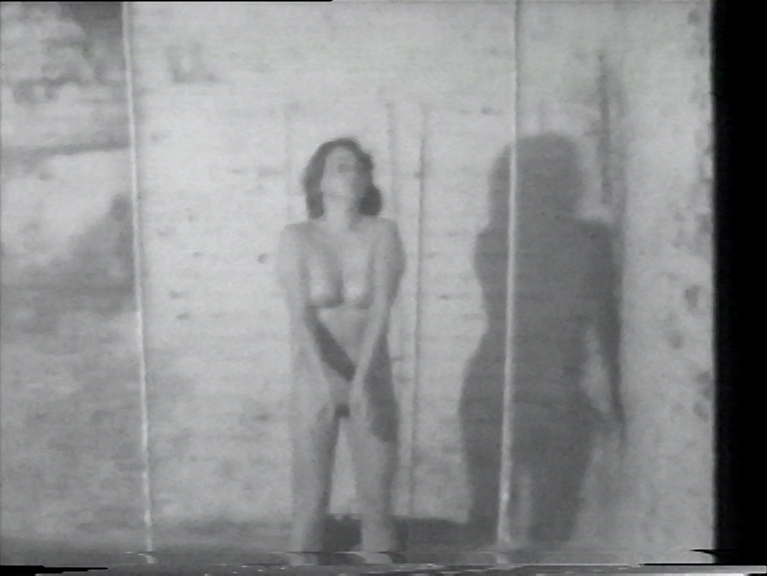
Hyberbulie (1973) by Valie Export
Hyperbulie is a performance work that pushes the body to its physical extremes. The performance elements are first established: a framework of wires are connected to electric batteries. Value Export appears and makes contact with live electricity as she negotiates the wire construction.
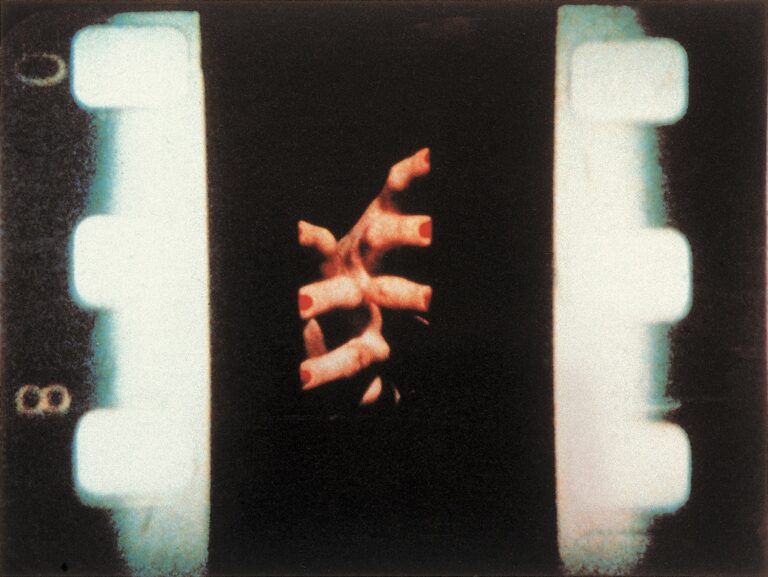
Syntagma (1984) by Valie Export
The striking insistence in Syntagma on the fragmented body of the woman, mute for the most part, has a twofold and seemingly contradictory impact. Fragmentation first appears to be the repetition of a trauma until, finally its frenetic pace turns into deliberate composition. In the traumatic sense, fragmentation reflects the epitome of objectification, an itemization of the goods: arms, legs, shoulders, breasts, faces, the depersonalized review of the chattel’s grade. The point is that while women may be objectified, they do not necessarily become objects. (Roswitha Müller)
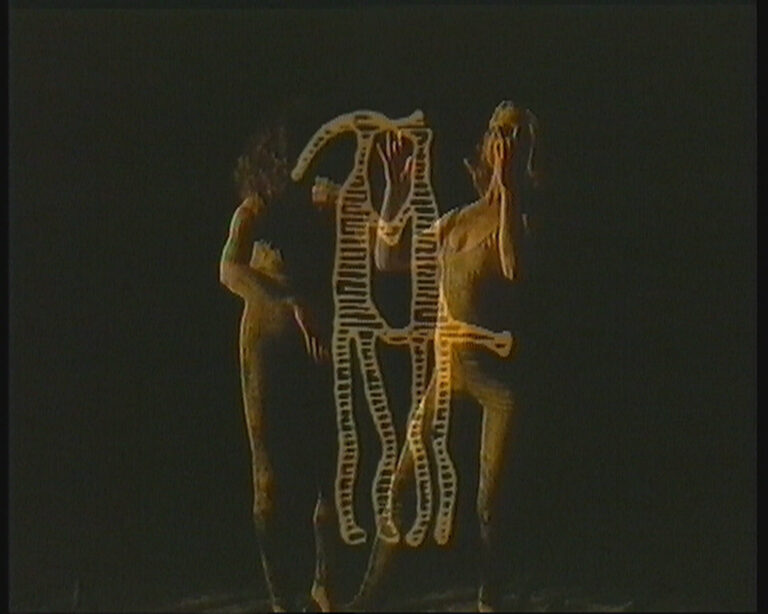
Die Zweiheit der Natur (The Duality of Nature) (1986) by Valie Export
The Duality of Nature is an experimental video that deals with the “duality of nature,” in other words natural nature and technical nature. Nature is always a construction, whether in dynamic processes, dis-analog systems or physical, technical signals. “Nature” formulates the organizational forms of representational strategies—symbolic structures, both in reality and in fiction. Where are the borders, the interfaces, the de-bordering and the analogies for “natural” nature and “technical” nature? These considerations provided the basis for the video. (Valie Export)